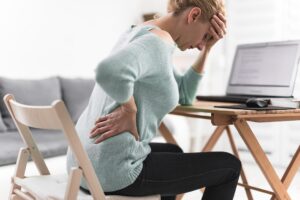
Hip bursitis is commonly diagnosed when patients have pain on the outside of their hip, when inflammation occurs between the thighbone and nearby tendons.
But several other issues can cause a similar type of pain and require different treatments. Further, they are often easier to treat, and future bouts of hip pain can be prevented.
Hip pain is likely most commonly the result of one of the following conditions:
Tendinitis: Tendinitis occurs when there’s inflammation in the tendons (fibrous bands of tissues) that connect the gluteal muscles in your buttocks and hip bone. It can develop from a muscle imbalance resulting from a lack of activity, crossing legs, or even sitting on a wallet.
Overuse: Walking or running with weak hip and buttock muscles can tighten and irritate a long ban of connective tissue that runs from the knee to the hip – the iliotibial (IT) band.
Tight Muscles: If gluteal muscles and IT bands are too tight, they pull at the thighbone where they attach, which can lead to pain on the other side.
Spine Problems: Sometimes, pain in a pinched nerve, spine arthritis, or bones in the spine rubbing together can lead to pain in the side of the hip.
To treat the pain, you may need to visit a doctor and a physical therapist. They may be able to diagnose the pain and offer the best treatments.
Thankfully, the pain almost always goes away with targeted exercise and stretching. Massage and a course of physical therapy is a very successful combination to loosen things up to make walking more comfortable.
Building core strength can also help by aligning muscles and taking pressure off of the hips.
Avoiding habits that can tighten muscles and add to pain can also help. Crossing legs or sitting too long are the main culprits of hip muscle tightness and pain.